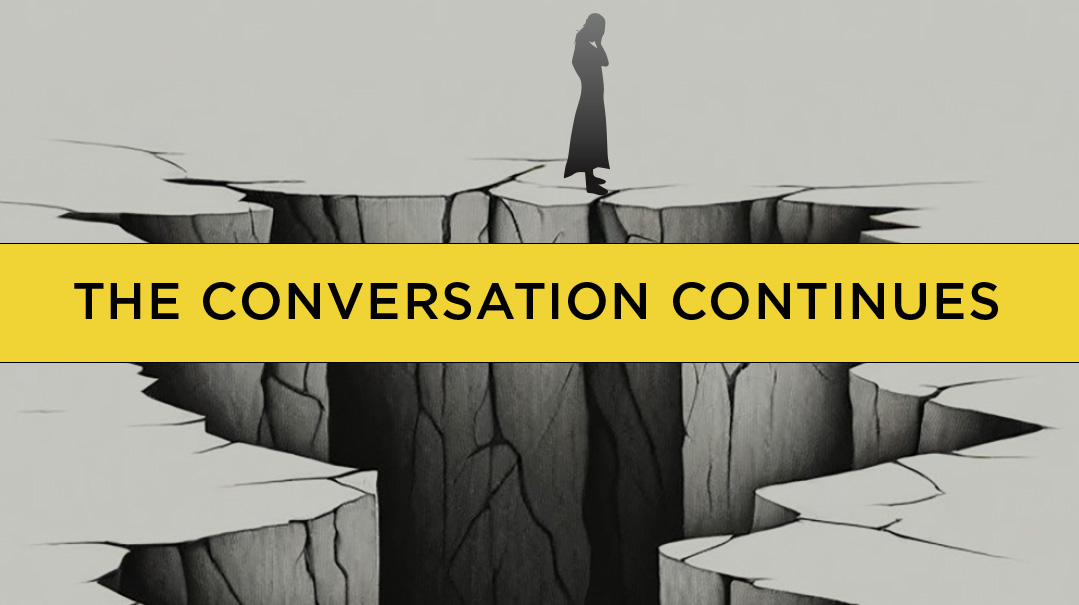The Best Policy: The Conversation Continues

“‘The Best Policy’ Double Take was a masterful description of what happens not only once in a while, but during every single seminary season”

Our Double Take installment in Issue 1001, about a teacher who feels obligated to disclose privileged information about Malki — a hardworking, happy student who had some struggles a few years before — to a seminary acceptance committee, drew vigorous feedback. Here is a sampling:
TIME TO LET GO
› Out of Hiding
“The Best Policy” Double Take was a masterful description of what happens not only once in a while, but during every single seminary season, every single high school and beis medrash application season, and for almost every shidduch suggestion.
It really isn’t fiction at all — we’ve all suffered through a version of this story, which is why everyone with any sense hides anything that could be construed as problematic. Child needs a tutor? Make sure the tutor doesn’t go anywhere near the school. Feeling depressed? Make sure the therapist has an office way out of town. We hide anything and everything that might be a problem.
Which makes it so hard to find out any information, and why we panic at the thought of anyone finding out anything. It’s why we call so many people about a shidduch idea and why seminaries give our Bais Yaakov girls an inspection worthy of the FBI. We hide diseases, depression, and any kind of rebellious streak a girl had years ago. And sadly, even if the person overcomes her nisayon, it doesn’t matter because her problem will follow her anyway.
We make it an absolute requirement to go to seminary, and then we make it cost a fortune and make it a yearlong panic to get in to the best one. And if our dear daughter doesn’t get in to the best seminary, well, there go all possibilities of a good shidduch. Why do we keep doing this to ourselves?
There is no excuse for this constant judging. The seminary principal is wrong for judging so harshly, the mother is wrong for blaming the 12th-grade mechaneches for doing what she must, the 12th-grade mechaneches is wrong to betray the trust of a parent, and we are all wrong for buying into this nonsense. Any seminary will be fine and even no seminary is a valid choice.
We are Yidden. We should hold ourselves to a higher standard than this. Please stop this madness and just accept the girls into seminary. Don’t let any bas Yisrael experience the torment that Malki had to go through. If the seminaries cannot find a way to prevent this pain, they are not living up to their mission as true educators. Perhaps it’s time to find a solution instead of shaking our heads at this sad story and turning the page.
A LITTLE MORE SENSITIVITY
› R.B.
As a 12th-grader who just received (baruch Hashem positive) answers from seminaries, I was very upset to see the Double Take that was published literally the day before the answers were sent out. For many girls, they may be facing rejection for the first time. Seeing the article during a point of so much uncertainty and anxiety was of help to no one.
Furthermore, girls might now feel that their own teachers sabotaged their chance of getting into the seminary of their dream, or for that matter any seminary at all. In truth, teachers have their students’ best interests at heart, and many teachers work very hard to ensure all their students can attend seminary. In the future, please try to be more sensitive to timely issues that affect our nation as a whole.
Don’t Lose the Diamonds
› B.D., London
While it’s fantastic to be aiming for purity in an institution, I believe that many times seminary heads are fooling themselves into believing that the sheltered ones are really as pure as they assume, especially in today’s world, and therefore casting aside those who may have struggled but have grown and matured and gained depth and character through that very struggle — which is what life is really about. They are missing out on diamonds that can enhance the institutions even more, perhaps, than another “pure” student who has never had to make a positive life choice.
WHERE’S THE GRATITUDE?
› A Faithful Reader
For years I’ve appreciated the quality reading you provide, read the articles that have people up in arms, and enjoyed the entertainment without feeling the need to say what I feel and think on any particular subject, always believing something was right for at least some segment of our diverse people.
But the recent Double Take made me feel like the mother has chosen to forget something huge — that it’s possible that her daughter wouldn’t have had a future at all had the talented 12th-grade mechaneches not intervened in such a remarkable way.
People can be too quick to forget a past favor. (Dr. Solomon Schonfeld once mentioned that he knew which children he saved on the Kindertransports because they were the ones who crossed the street to avoid him.)
TOP SEMINARIES FOR TOP GIRLS
› Your daughter’s seminary host (whose husband finds material for her reports)
While this story rankles on so many levels, ultimately the party to blame here is Malki’s mother, Adina.
Why are you so desperate for your daughter to go to a “top” seminary, and how do you even define top?
Today, a seminary that is considered “top” is very academic. The research out there that correlates academic success with success in life is practically nil, yet we in the frum world continue to consider academic prowess the measure of a girl.
Had Malki been accepted to Machon Aliza Rivkah — or any of a number of other non-fictional “top” seminaries, she would spend much of her year working on a number of reports, sometimes several at the same time, and often on subjects that offer little real-life guidance. Of course, there will be a good dose of inspiring speakers and classes throughout the year, but the one thing all of these lectures will have in common is that not one shiur or speech will dig too deeply into issues your daughter may honestly be struggling with but is afraid to bring up (because she understands that there are questions she just shouldn’t be asking. Should she try to have one of these conversations one on one with a teacher that may be suited to answer her, that teacher may be censured or fired should the school find out).
Which is why I blame you, Malki’s mother, Adina.
There is not a seminary out there who truly believes that a girl needs a midrash report to succeed in her mission as a bas Yisrael. There are teachers well equipped to deal with some of the issues that plague our generation if only they were allowed to bring them up in a real way that acknowledges that good girls can have these struggles. So, why are things the way they are? Because every one of those “top” seminaries knows that if they were to leave behind the overly academic approach and dare bring up issues that many girls are thinking about and struggling with, parents would be horrified that they’d sent their child to a place where there are girls struggling with those issues, never once dreaming one of those girls might be their very own daughter.
No seminary can be effective if it’s forced to close down, and so “top” seminaries continue to cater to “top” girls, even when they know they are creating a very small box with some very superficial definitions of what’s right, and even when they know that they are rejecting girls that could be pillars of the Jewish nation.
In short, Adina, your daughter was rejected from the seminary of her dreams — exactly because you insist that they do.
MY BAGGAGE FOLLOWS ME
› Another Malki
I’m a 12th-grader with an imperfect past and plenty of baggage. There was a time when I frequently skipped school, acted with much disrespect toward teachers, and generally lacked seriousness toward school. Yes, I did many things that I am not proud of; however, I have diligently worked on improving myself, and today, I am a completely different student.
I felt tears well up reading this story. Unfortunately, this is exactly what might prevent girls from reaching out to mentors or teachers who can truly help them, because they never know when it will come back to bite them. I know that was certainly the case for me. I was afraid that these teachers or mentors might one day get calls about me and my struggles would be shared.
Furthermore, I hope seminaries can truly understand the extent of my personal growth and the considerable effort I’ve invested in transforming myself. I cannot even begin to describe the extent of work it took to uproot my nature and shape up from all my past baggage.
I believe I even have a certain advantage over other applicants, as I am a person who actually had to work on my growth, to make a conscious decision to change and improve myself. And I am proud to say that I had a profound transformation. Yet the moment they hear about my past, they are turned off.
I wish they would consider girls like me, who took the initiative to change themselves for the better — emerging stronger and more committed. It deeply hurts me that my past baggage, no matter how far removed I am from it today, is something that still follows me and still causes others to judge.
UNDERMINING PERSONAL GROWTH
› A Pained Mechaneches
I would like to preface my comment with an apology for being direct and unapologetic. I was very surprised by the poor judgment and self-righteous attitude of the teacher who gave negative information about her former student, but I am appalled at the lack of indignant responses from readers. I was expecting loads of angry letters to the editor bashing the teacher. Every mechaneches and parent should have raised the roof about this. Why the deafening silence?
How dare the teacher bring up something from four years earlier, which was told in confidence? Aside from lashon hara, breach of confidence and sheer stupidity, it also undermines the value of personal growth. Every student is a work in progress, especially in high school. I would assume that the 12th-grade mechaneches would take great pride in the growth of the student since 9th grade, and help her grow even more by affording her a year in a fabulous environment. Where is your understanding about the challenges and growth of high school students, especially that this is a success story? Why is that being held against her?
I am not discussing the holier-than-thou attitude of the seminary. When a principal is bombarded with applications, she wants to be selective — that’s her prerogative. This wonderful girl doesn’t even belong in her seminary, as the principal is too narrow-minded to see girls as diamonds with many facets. This seminary is a cookie cutter, image-driven business. This lovely girl shouldn’t even feel bad about not going somewhere with such an exclusive vision. I would welcome such a girl who has shown such fortitude and personal growth — she has chosen to be better, she owns her values, she doesn’t merely parrot “politically correct” phrases.
We all know that when giving information about a shidduch, you only bring up what is relevant. Why did the teacher justify herself that “she did it for the good of the school?”
The only thing that she accomplished is that she may have taught teenagers not to open up to others for help because it might be used against them at some point.
To all the teenagers out there who are reading this, please allow yourself to reach out to your teachers and role models. Don’t lose trust in the system. The teen years are confusing, and most mechanchos are trustworthy and have your best interests at heart.
(Originally featured in Mishpacha, Issue 1003)
Oops! We could not locate your form.







